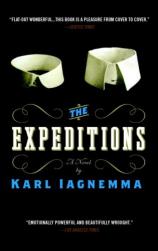Reading Group Guide
Discussion Questions
The Expeditions

1. What outlook on humanity is captured in the epigraph from Walt Whitman’s poem “With Antecedents”? How might the novel’s characters have responded to these lines?
2. Which historical details in the novel surprised you? What cultural aspects of Elisha’s world remain part of the contemporary American experience?
3. Discuss the varying quests presented by the novel’s expeditions. What essential motivations do the characters share in embarking on their journeys? Whose quest is filled most successfully?
4. In Chapter Two, Part One, Reverend Stone listens to a draft of a sermon read by Edson, the deacon, concerning geology and religion. What approaches to religion and science are captured in that scene? How do they compare to Professor Tiffin’s notions of Native American genesis, and to other images of religious fervor portrayed in the novel?
5. In Chapter One, Part Two, Elisha compares the expedition to his time collecting specimens with Alpheus Lenz. How comfortable is he with the role of apprentice? Does his relationship with his father have any bearing on the way he relates to other men in positions of authority?
6. What transformation takes place in Reverend Stone when Adele gives him messages from his wife, Ellen, at the end of Chapter Two, Part Two? How does her illness affect him? How does it affect Elisha?
7. How does the story of Adele and Jonah Crawley’s marriage shape Reverend Stone’s journey? Did his shifting perceptions of Jonah correspond to yours?
8. What does Susette teach Elisha about trust, attraction, and his capacity for saving someone he cares for? Why is he able to confront Ignace Morel while others hesitate to defend her?
9. Near the end of Chapter Four, Part Two, Reverend Stone drinks cider in a Detroit bar and contemplates whether is it possible to live without faith. Did that question have greater significance in the nineteenth century, when hardships such as Stone’s stolen money and severe illness posed an even greater threat than they would today?
10. Discuss the differences between Professor Tiffin and Mr. Brush. In what ways is Tiffin’s biracial marriage a barometer for compassion among his colleagues? How does Elisha’s perception of the world differ from Tiffin’s and Brush’s?
11. How might the arrival of Professor Tiffin and Elisha have unfolded if it had been described from the Chippewas’ point of view? What fundamental aspects of Chippewa culture were incomprehensible to those on the expedition?
12. In Chapter Two, Part Three, Reverend Stone recalls his distant, reticent father, who told him, “You know who you are when you know what you fear.” What fears are at the root of his anguish, and Elisha’s?
13. How would you have fared on a journey like Reverend Stone’s, decades before the communication age, traveling uncharted terrain? Has twenty-first-century ingenuity eased the timeless human struggles of mourning and family strife?
14. Elisha attempts to make sense of his decision to run away from his family, while Reverend Stone struggles with anguished guilt. What was the essence of their estrangement? Would they have ever reached a point of reconciliation if Ellen had survived? Why was she able to forgive her son more easily?
15. What themes of longing and identity run through both this novel and the stories collected in On the Nature of Human Romantic Interaction?
The Expeditions
- Publication Date: February 24, 2009
- Paperback: 336 pages
- Publisher: Dial Press Trade Paperback
- ISBN-10: 0385335962
- ISBN-13: 9780385335966








